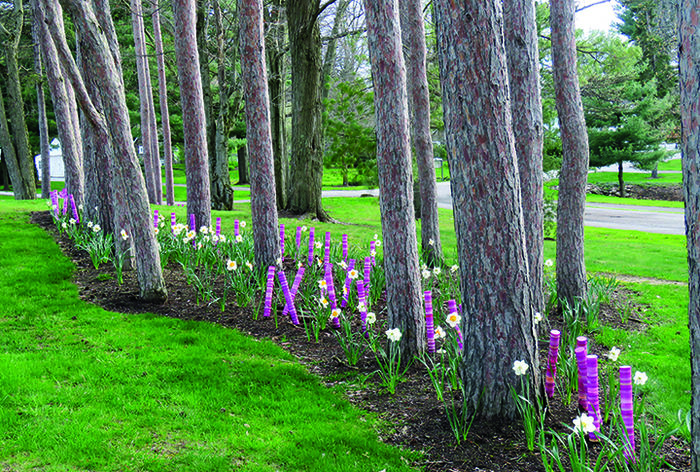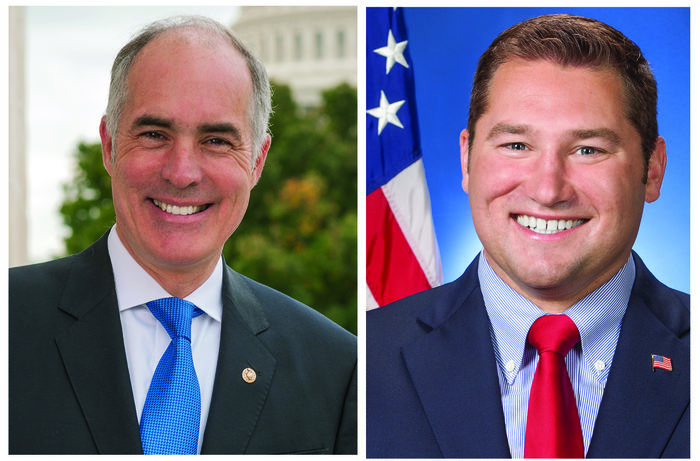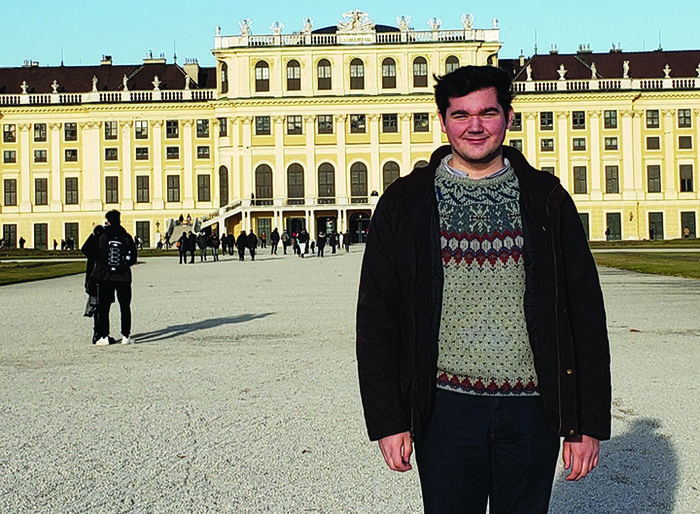Use these links to jump to a specific item below.
Public art project brightens campus
The greenspace between Reed Union Building and Erie Hall had a little extra color this past year. “Colorwalk,” an outdoor art installation made up of more than 8,000 stacked pink plastic discs, meandered through a tree line near the Reed Building.
As part of Penn State’s Campus Arts Initiative, Cleveland-based sculptor Lauren Herzak-Bauman worked with faculty members and students in the plastics engineering technology (PLET) program to mold and fabricate the discs needed for “Colorwalk,” which was on display from last November through July of this summer.
“Colorwalk” was unique in how the project achieved the cross-disciplinary mission of the Campus Arts Initiative. Behrend arts administration students assisted with selection of the artist and helped document and promote the project while PLET students worked alongside the artist to fabricate the plastic discs.
Data Visualization minor added
We’re in the age of big data, when companies and organizations gather oceans of information about consumers. The volume of information can be overwhelming. Managing that volume requires someone skilled in organizing, assessing, and packaging data to tell a visual story that provides the meaning behind the numbers to business leaders and non-technical types.
Enter one of the fastest growing professions and the newest minor to be offered by the School of Humanities and Social Sciences—Data Visualization. The coursework in the minor is designed to educate students in translating data into visual stories that provide insights for decision-makers in government, insurance, banking, health care, research, education, and more.
The minor is open to students in any major at Penn State Behrend. For more information, contact Dr. Lisa Jo Elliott, assistant teaching professor of psychology, at [email protected] or 814-898-6952.
Students practice Zoom speaking skills
Penn State Behrend students enrolled in the spring semester of CAS100 Effective Communication likely did not expect to be giving their public speaking presentations from their own homes via Zoom video conferencing. But the COVID-19 crisis changed a lot of things, and as Dr. Rod Troester, associate professor of speech communication, pointed out, some of those changes may be permanent.
“These students will likely be doing many such presentations in the future, so this is a taste of things to come,” Troester said. “I think this pandemic is going to change many things about the way we do business in the future. It may be that companies no longer want to fly people in from around the world to gather in a conference room when you can just as effectively communicate online with video software.”
To do their presentations, the students in CAS100 took turns speaking and sharing their computer screens with spreadsheets and other supporting materials they had created.
It’s easy to envision the same thing happening in a global company, with staff members collaborating and reporting from various locations around the world.
It will be second nature to these students, who will be digital natives well-versed in communicating their ideas and working together while miles apart.
Lawmakers drop in on Political Science Zoom meeting
Students in the Political Science program typically end the academic year at a celebratory dinner with their faculty members. This year, with restaurants closed due to COVID-19, the program’s chair, Dr. Robert Speel, came up with something different: A group Zoom call with surprise appearances by U.S. Senator Bob Casey and U.S. Representative Guy Reschenthaler.
“It was a way to still have the dinner, and to make it one they’ll remember,” said Speel, an associate professor of political science.
Casey talked with the group for nearly 15 minutes. Reschenthaler, who graduated from Behrend with a Political Science degree in 2004, spent nearly an hour on the call.
“It wasn’t quite, ‘Please hold for the president,’” said John Jarecki, now a Political Science graduate who will continue his studies at the University of Dayton School of Law this fall, “but it was still pretty surreal.”
Faculty News
Arrivals and Departures
The School of Humanities and Social Sciences welcomes Professor Dr. Elisa Beshero-Bondar, Digital Media, Arts, and Technology; Assistant Teaching Professor Justin Fanzo, game design; and Assistant Teaching Professor Michelle Cook, Elementary and Early Childhood Education. In turn, the School bid a fond farewell to several longtime faculty and staff members. Dr. Mary Connerty, teaching professor of English and English language learning, retired after 23 years; Dr. Sharon Dale, professor of art history and arts administration, retired after 30 years; and distinguished professor Dr. John Gamble, political science and international law, closed out a Behrend career that spanned more than 40 years. Administrative support specialist Jackie May left Behrend after 25 years. They will all be missed.
Honors, Distinctions, and Accomplishments
Dr. Melanie Hetzel-Riggin, professor of psychology, won a 2019-2020 Women Making History Award given by Erie’s Mercy Center for Women. Two faculty members won college-wide awards: Dr. Shariffah Sheik Dawood, assistant teaching professor of psychology, Council of Fellows Excellence in Teaching Award; and Dr. Lena Surzhko-Harned, assistant teaching professor of political science, the Guy W. Wilson Excellence in Academic Advising Award. Two professors won school awards: Dr. John Champagne, professor of English, won the research award; and Dr. Ashley Sullivan, assistant professor of early childhood education, earned the outreach award. Emily Cassano, theatre, was promoted to assistant teaching professor. Dr. Sarah Whitney, English and women’s studies, and Dr. Ashley Yochim, English, were both promoted to associate teaching professor.
Research and Creative Activity
Faculty members published more than fifty articles and book chapters, presented more than 100 conference papers and posters, and were awarded more than forty research and travel grants. They also published the following books: Dr. Joseph Beilein, history, editor of William Gregg’s Civil War: The Battle to Shape the History of Guerrilla Warfare; Dr. John Champagne, English, Queer Ventennio, Italian Fascism, Homoerotic Art, and the Nonmodern in the Modern; Dr. Matthew Levy, arts administration, Abstract Painting and the Minimalist Critiques: Robert Mangold, David Novros, and Jo Baer in the 1960s; Dr. Ashley Sullivan, elementary and early childhood education, and Dr. Laurie Urraro, Spanish, Voices of Transgender Children in Early Childhood Education: Reflections on Resistance and Resiliency.
Alumnus teaches in Vienna
Political science degree, German studies certificate lead to Austrian adventure
Zane Dilts ’19 is clearly the kind of person who enjoys a challenge. The Schreyer Honors College graduate majored in Political Science, minored in Applied Economics, and also earned a German Studies certificate.
“During my sophomore year, I spent a semester in Freiberg, Germany,” he said. “I loved that experience and knew then that I wanted to spend more time abroad after graduation.”
Teaching English was a great way to achieve that goal, and Dilts worked hard to secure a fully funded United States Teaching Assistantship (USTA) and was placed in Vienna, Austria, for the 2019-20 school year.
As a teaching assistant, Dilts primarily discussed cultural issues, politics, and everyday life in America, rather than teaching grammar or grading students’ work. He worked at two different schools, which is common in the USTA program, alternating weeks at each. His youngest students were 10 and 11 years old and the oldest were high school seniors.
“It was fascinating to hear outside views and opinions of America,” he said. “It turns out that Austrian teens love Billie Eilish and Ariana Grande. The blank stares they gave me when I told them my favorite musicians were Bob Dylan and David Bowie led me to believe older rock is a little less popular.”
Dilts fell in love with the city.
“I never got used to just how stunning every corner of Vienna is,” he said. “I lived near the first district, the city’s historic center, where many of the famous sites are. I spent many nights just walking around, gazing at the buildings and statues.”
He also found it to be more multifaceted than he expected.
“Around Christmas time, I went to a Christmas market, then to an orchestral concert at the Rathaus, then to an underground punk show. This was all in one night and the locations were just fifteen minutes apart. Vienna really has it all, except good Mexican food!”
Though Dilts was far from home, he was still affected by the COVID-19 pandemic.
“Austria was quick to respond to the threat and enact measures,” he said. “Schools were closed in late March and classes shifted online, so, like many in America, I taught through Zoom and similar services.”
His former German professor is not surprised at his perseverance.
“Apparently nothing, not even a pandemic, can stop Zane from attaining the goals he sets for himself,” said Dr. Eva Kuttenberg, associate professor of German.
With an extension of funding through the USTA program, Dilts plans to return to Austria in September to again serve as a teaching assistant.
“Then, I hope to pursue a master’s degree related to economics, hopefully at a German university,” he said.
Thousands participate in Lake Effect poetry contest
Each year, the Bachelor of Fine Arts in Creative Writing hosts a high school poetry contest, inviting writers in grades 9 through 12 from across the country to submit their best prose to the Lake Effect National High School Poetry Competition.
The 2019 competition drew more than 3,000 submissions. From among those, B.F.A. in creative writing faculty members selected three winners of cash prizes, nine finalists, and forty semi-finalists. All finalists received a copy of Lake Effect, an international journal of the literary arts edited by B.F.A. faculty members and students.
Read the winning poem by Kate Li of Naperville, Illinois, and see all finalists’ poems at Lake Effect High School Poetry Competition.


